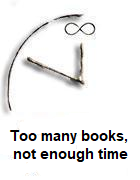By this point you might have noticed that I’m fond of high concept stories, of big glittering ideas that would appeal even if they were presented without an attached plot or characters. Such stories are also easier to recommend. It’s difficult to articulate why a character’s decision is so moving, or convince you of the authenticity of a relationship in a single excerpted paragraph, but it’s quite simple to tell you the high concept, and you can make up your own mind whether you want to see that high concept explored or not.
That being said, here’s another story all about exploring a really neat idea.
Have you ever wrung dry a wet cloth? Wrung it bone white dry – with only the grip of your fingers and the muscles of your arms? If you have done this, you will understand better the situation of the captives at Device Z when the warders set them the task of the long sheet.
The titular sheet is a hundred feet long. It is coarse white linen bundled into a cylinder six inches wide, and is thoroughly waterlogged. It stretches through five windowless rooms, three feet above the floor. Each of these rooms has a number of captives. When they are brought in, they are told that they are free to go once their room’s section of the sheet is dry: bone dry, with not a droplet of moisture remaining. Even worse, the captives must work in a steamy environment, where sweat and steam will always add to the moisture of the sheet; but never at a rate faster than a diligent worker could wring water out. The task is not impossible, merely slow.
The rest of the story takes a long at how different rooms of captives cope with this soul-crushing task. For example, the first room discussed contains two married couples and a grocer, and they immediately create a businesslike schedule of four-hour shifts.
However, as I said, they were not equal to the task. The framework of habit overcame them. Like so many who live within a steady, comfortable routine, they allowed the routine around the work to predominate in importance above the work itself. They arrived at the long sheet punctually, and with consciences thus satisfied they put insufficient effort into the actual work. Furthermore, when they had fulfilled the routine assiduously for a period, one or the other would congratulate his conscience and really believe that he deserved a ‘little relaxation’. And he would take the afternoon off. Such was the force of emphasis on obedience to the letter that he was convinced the law would not suffer.
The omniscient narrator moves from room to room, surveying a wide variety of attitudes towards a task that needs to be done. As the tour goes on, and each successive roomful of captives will never succeed for different reasons, the question soon becomes if there is any human mentality capable of completing the task of the long sheet. It’s a claustrophobic and wonderfully oppressive story, the oppression all the stronger because in every case it’s self-inflicted by the captives’ own weaknesses.
By the way, when doing my cursory research for these stories I often find forum posts asking for summaries and analyses of the stories, usually a blatant request for the internet to do their school homework for them. This story yielded one of the more forlorn attempts I’ve seen, with an unresponded forum thread entitled “I know this is a longshot, but I need a William Sansom expert.” I don’t think any exist, I’m afraid.
The Long Sheet by William Sansom
Availability: print
Word count: 8,400
First published: Something Terrible, Something Lovely, collection, 1944
Where to find it: Various Temptations, collection, 2002, Tartarus Press
The Weird, edited by Jeff VanderMeer & Ann VanderMeer, 2012, Tor

I love this story. It’s twist(ish) ending is ridiculously frustrating and satisfying at the same time.
This tale is rife with impoverishment of the soul and the human condition in general. It was quite the frustrating read and the conclusion saddened me. So many of us want to achieve our goals without truly putting forth the requisite effort, yet we expect results just the same. I wrote a piece on the story in college and I’d really like to read it again, but it’s packed away and I don’t know how long it would take me to find it. I’m afraid it’s too much like work. Oh, the humanity …